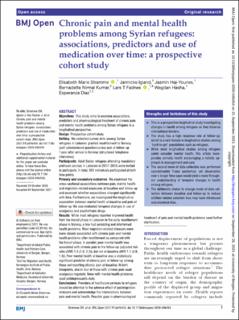| dc.contributor.author | Strømme, Elisabeth Marie | |
| dc.contributor.author | Igland, Jannicke | |
| dc.contributor.author | Younes, Jasmin Haj | |
| dc.contributor.author | Kumar, Bernadette. N | |
| dc.contributor.author | Fadnes, Lars T. | |
| dc.contributor.author | Hasha, Wegdan Hamed Nasser | |
| dc.contributor.author | Diaz, Esperanza | |
| dc.date.accessioned | 2021-09-28T06:14:19Z | |
| dc.date.available | 2021-09-28T06:14:19Z | |
| dc.date.created | 2021-09-27T08:59:01Z | |
| dc.date.issued | 2021 | |
| dc.identifier.issn | 2044-6055 | |
| dc.identifier.uri | https://hdl.handle.net/11250/2783874 | |
| dc.description.abstract | Objectives This study aims to examine associations, predictors and pharmacological treatment of chronic pain and mental health problems among Syrian refugees in a longitudinal perspective.
Design Prospective cohort study.
Setting We collected survey data among Syrian refugees in Lebanon granted resettlement to Norway (self-administered questionnaires) and at follow-up 1 year after arrival in Norway (structured telephone interviews).
Participants Adult Syrian refugees attending mandatory pretravel courses in Lebanon in 2017–2018 were invited to participate. In total, 353 individuals participated at both time points.
Primary and secondary outcomes We examined the cross-sectional associations between pain, mental health and migration-related exposures at baseline and follow-up and assessed whether associations changed significantly with time. Furthermore, we investigated the longitudinal association between mental health at baseline and pain at follow-up. We also evaluated temporal changes in use of analgesics and psychotropic drugs.
Results While most refugees reported improved health from the transit phase in Lebanon to the early resettlement phase in Norway, a few had persisting and intertwined health problems. Most migration-related stressors were more closely associated with chronic pain and mental health problems after resettlement as compared with the transit phase. In parallel, poor mental health was associated with chronic pain in the follow-up (adjusted risk ratio (ARR) 1.5 (1.0, 2.2)), but not at baseline (ARR 1.1 (0.8, 1.5)). Poor mental health at baseline was a statistically significant predictor of chronic pain at follow-up among those not reporting chronic pain at baseline. At both timepoints, one in four of those with chronic pain used analgesics regularly. None with mental health problems used antidepressants daily.
Conclusions Providers of healthcare services to refugees should be attentive to the adverse effect of postmigration stressors and acknowledge the interrelations between pain and mental health. Possible gaps in pharmacological treatment of pain and mental health problems need further clarification. | en_US |
| dc.language.iso | eng | en_US |
| dc.publisher | BMJ | en_US |
| dc.rights | Navngivelse-Ikkekommersiell 4.0 Internasjonal | * |
| dc.rights.uri | http://creativecommons.org/licenses/by-nc/4.0/deed.no | * |
| dc.title | Chronic pain and mental health problems among Syrian refugees: associations, predictors and use of medication over time: a prospective cohort study | en_US |
| dc.type | Journal article | en_US |
| dc.type | Peer reviewed | en_US |
| dc.description.version | publishedVersion | en_US |
| dc.rights.holder | Copyright 2021 The Author(s) | en_US |
| dc.source.articlenumber | e046454 | en_US |
| cristin.ispublished | true | |
| cristin.fulltext | original | |
| cristin.qualitycode | 1 | |
| dc.identifier.doi | 10.1136/bmjopen-2020-046454 | |
| dc.identifier.cristin | 1938731 | |
| dc.source.journal | BMJ Open | en_US |
| dc.identifier.citation | BMJ Open. 2021, 11:e046454 | en_US |
| dc.source.volume | 11 | en_US |

